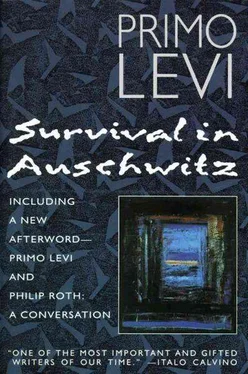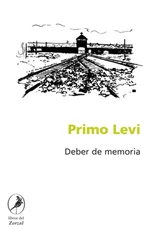So I give up asking questions and soon slip into a bitter and tense sleep. But it is not rest: I feel myself threatened, besieged, at every moment I am ready to draw myself into a spasm of defense. I dream and I seem to sleep on a road, on a bridge, across a door through which many people are passing. And now, oh, so early, the reveille sounds. The entire hut shakes to its foundations, the lights are put on, everyone near me bustles around in a sudden frantic activity. They shake the blankets raising clouds of fetid dust, they dress with feverish hurry, they run outside into the freezing air half-dressed, they rush headlong towards the latrines and washrooms. Some, bestially, urinate while they run to save time, because within five minutes begins the distribution of bread, of bread-Brot-Broid-chleb-pain-lechem-keynér, of the holy grey slab which seems gigantic in your neighbour’s hand, and in your own hand so small as to make you cry. It is a daily hallucination to which in the end one becomes accustomed: but at the beginning it is so irresistible that many of us, after long discussions on our own open and constant misfortune and the shameless luck of others, finally exchange our ration, at which the illusion is renewed inverted, leaving everyone discontented and frustrated.
Bread is also our only money: in the few minutes which elapse between its distribution and consumption, the Block resounds with claims, quarrels and scuffles. It is the creditors of yesterday who are claiming payment in the brief moment in which the debtor is solvent. After which a relative quiet begins and many take advantage to go to the latrines again to smoke half a cigarette, or to the washrooms to wash themselves properly.
The washroom is far from attractive. It is badly lighted, full of draughts, with the brick floor covered by a layer of mud. The water is not drinkable; it has a revolting smell and often fails for many hours. The walls are covered by curious didactic frescoes: for example, there is the good Häftling, portrayed stripped to the waist, about to diligently soap his sheared and rosy cranium, and the bad Häftling, with a strong Semitic nose and a greenish colour, bundled up in his ostentatiously stained clothes with a beret on his head, who cautiously dips a finger into the water of the washbasin. Under the first is written : ‘So bist du rein’ (like this you are clean), and under the second: ‘So gehst du ein’ (like this you come to a bad end); and lower down, in doubtful French but in Gothic script: ‘La propreté, c’est la santé.’
On the opposite wall an enormous white, red and black louse encamps, with the writing: ‘Ein Laus, dein Tod’ (a louse is your death), and the inspired distich:
Nach dent Abort, vor dem Essen
Hände waschen, nicht vergessen.
(After the latrine, before eating, wash your hands, do not forget.)
For many weeks I considered these warnings about hygiene as pure examples of the Teutonic sense of humour, in the style of the dialogue about the truss which we had heard on our entry into the Lager. But later I understood that their unknown authors, perhaps without realizing it, were not far from some very important truths. In this place it is practically pointless to wash every day in the turbid water of the filthy washbasins for purposes of cleanliness and health; but it is most important as a symptom of remaining vitality, and necessary as an instrument of moral survival.
I must confess it: after only one week of prison, the instinct for cleanliness disappeared in me. I wander aimlessly around the washroom when I suddenly see Steinlauf, my friend aged almost fifty, with nude torso, scrub his neck and shoulders with little success (he has no soap) but great energy. Steinlauf sees me and greets me, and without preamble asks me severely why I do not wash. Why should I wash? Would I be better off than I am? Would I please someone more? Would I live a day, an hour longer? I would probably live a shorter time, because to wash is an effort, a waste of energy and warmth. Does not Steinlauf know that after half an hour with the coal sacks every difference between him and me will have disappeared? The more I think about it, the more washing one’s face in our condition seems a stupid feat, even frivolous: a mechanical habit, or worse, a dismal repetition of an extinct rite. We will all die, we are all about to die: if they give me ten minutes between the reveille and work, I want to dedicate them to something else, to draw into myself, to weigh up things, or merely to look at the sky and think that I am looking at it perhaps for the last time; or even to let myself live, to indulge myself in the luxury of an idle moment.
But Steinlauf interrupts me. He has finished washing and is now drying himself with his cloth jacket which he was holding before wrapped up between his knees and which he will soon put on. And without interrupting the operation he administers me a complete lesson.
It grieves me now that I have forgotten his plain, outspoken words, the words of ex-sergeant Steinlauf of the Austro-Hungarian army, Iron Cross of the ’14–’18 war. It grieves me because it means that I have to translate his uncertain Italian and his quiet manner of speaking of a good soldier into my language of an incredulous man. But this was the sense, not forgotten either then or later: that precisely because the Lager was a great machine to reduce us to beasts, we must not become beasts; that even in this place one can survive, and therefore one must want to survive, to tell the story, to bear witness; and that to survive we must force ourselves to save at least the skeleton, the scaffolding, the form of civilization. We are slaves, deprived of every right, exposed to every insult, condemned to certain death, but we still possess one power, and we must defend it with all our strength for it is the last — the power to refuse our consent. So we must certainly wash our faces without soap in dirty water and dry ourselves on our jackets. We must polish our shoes, not because the regulation states it, but for dignity and propriety. We must walk erect, without dragging our feet, not in homage to Prussian discipline but to remain alive, not to begin to die.
These things Steinlauf, a man of good will, told me; strange things to my unaccustomed ear, understood and accepted only in part, and softened by an easier, more flexible and blander doctrine, which for centuries has found its dwelling place on the other side of the Alps; according to which, among other things, nothing is of greater vanity than to force oneself to swallow whole a moral system elaborated by others, under another sky. No, the wisdom and virtue of Steinlauf, certainly good for him, is not enough for me. In the face of this complicated world my ideas of damnation are confused; is it really necessary to elaborate a system and put it into practice? Or would it not be better to acknowledge one’s lack of a system?
The days all seem alike and it is not easy to count them For days now we have formed teams of two, from the railway to the store — a hundred yards over thawing ground. To the store, bending underneath the load, back again, arms hanging down one’s sides, not speaking.
Around us, everything is hostile. Above us the malevolent clouds chase each other to separate us from the sun; on all sides the squalor of the toiling steel closes in on us. We have never seen its boundaries, but we feel all around us the evil presence of the barbed wire that separates us from the world. And on the scaffolding, on the trains being switched about, on the roads, in the pits, in the offices, men and more men, slaves and masters, the masters slaves themselves. Fear motivates the former, hatred the latter, all other forces are silent. All are enemies or rivals.
Читать дальше












